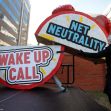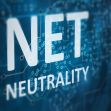The California Public Utilities Commission (CPUC) filed a complaint on January 14 challenging the Federal Communications Commission (FCC) on its final rule published earlier in the month upholding a repeal of Obama-era net neutrality rules. The finalized rule, “Restoring Internet Freedom; Bridging the Digital Divide for Low-Income Consumers; Lifeline and Link Up Reform and Modernization” was published in the Federal Register on January 7, 2021.
The FCC reclassified broadband in 2018 as an “information service,” which allowed Internet Service Providers greater authority to regulate internet traffic and charge websites for faster services without fear of interference from federal authorities. The decision by the FCC to repeal net neutrality was challenged in the US Court of Appeals in the case Mozilla vs. FCC. In October 2019 the Court of Appeals upheld FCC’s decision to repeal the regulation but forced the FCC to reexamine how the decision would impact public safety.
The CPUC filed the complaint with the US Court of Appeals for the District of Columbia claiming the decision to uphold the FCC’s decision is “arbitrary, capricious, and an abuse of discretion within the meaning of the Administrative Procedure Act.” The CPUC further argues that the finalized rule violates not just the US Constitution but also the Communications Act of 1934.
In 1934, under the Communications Act, Congress created the FCC to regulate and oversee the telephone, telegraph, and radio communication industries. In 1996, the Act was amended to include broadcast, cable, satellite television, and the internet. The Act has expanded over the years and regulates aspects of these industries such as “frequencies, rates and fees, standards, competition, terms of subscriber access, commercials, broadcasting the in the public interest, and government use of communications systems.”
The challenges to the power and control ISP has over the Internet comes down to a problem of classifications. When broadband is classified as a “telecommunications service,” it falls under Title II of the Communications Act, which has “common carrier status” and is protected by net neutrality law. But if broadband is classified as an “information service,” it falls under the regulations of Title I, which in comparison is deregulated, giving ISPs the room to exert their control and authority.
In 2015, under then-president Barack Obama, the FCC issued a rule on net neutrality that restricted internet service providers (ISPs) from blocking or slowing internet content. They were also prohibited from offering paid “fast lanes.” This ensured that ISPs would act as a “neutral gateway” rather than gatekeepers and provide for free and open access to the Internet. The FCC decided in a 3-2 vote that broadband would be classified as a “telecommunications service.”
However, in 2018, as one of the first acts of the Trump Administration, the FCC repealed those restrictions and granted ISPs more power to regulate how Americans use the internet by reclassifying broadband as an “information service.” ISPs were only required to disclose the changes to users. After the repeal, ISPs can charge websites to provide faster downloads and control internet traffic. This move by the FCC was challenged in the court case Mozilla vs. FCC. In October 2019, the US Court of Appeals sided in favor of the FCC, upholding the repeal of net neutrality protections. However, the decision did not remark on whether individual states could implement such protections.
California’s net neutrality law, SB 822 (2018), is still under attack by a lawsuit filed by the United States and providers like AT&T and Comcast. It is the only state that continues to guarantee the net neutrality protections from the 2015 Open Internet Order. The act was in direct response to FCC Chairman Pai’s repeal. California’s law gives the power to control the sites and services used to the user, and not to the ISPs, who are prohibited from impacting the speed of websites.
Under the Trump Administration, the FCC was chaired by Ajit Pai. Pai announced days after the 2020 Presidential Election that he would be leaving the FCC as the Biden Administration takes office on January 20, 2021. Pai became a commissioner of the five-member FCC in 2012 after leaving a position as the in-house lawyer for Verizon Communications.
President Biden named Jessica Rosenworcel as the acting chair of the FCC after Pai’s exit from the commission. Rosenworcel joined the FCC in 2012 and was confirmed by the Senate for an additional term beginning in 2017. She has been a champion of net neutrality throughout her tenure on the FCC. This change in administration as well as the change in leadership of the FCC hearkens the probability of a new future for net neutrality on a federal level and at the state level as well.






